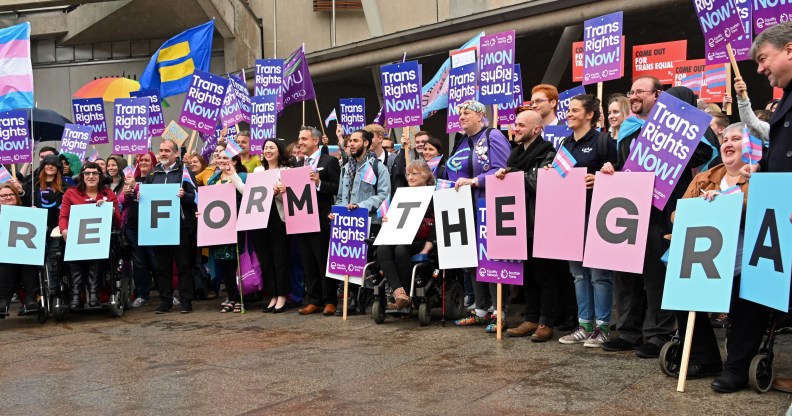Stacks of obscene and disgusting transphobic leaflets found at Royal Mail sorting office

Protesters demonstrate outside the Scottish Parliament for reform of the GRA on June 12, 2019 in Edinburgh. (Ken Jack/Getty Images)
“Hateful” transphobic flyers were found at a Royal Mail sorting office in Edinburgh, Scotland, prompting staff to bin them following complaints.
At a Royal Mail branch in the city, two stacks of leaflets were found by staffers, causing alarm among local residents left aghast by what they said were the “dangerous” messages they contain.
The courier company confirmed to EdinburghLive that it had binned the leaflets left at its Portobello delivery office, representatives saying Royal Mail has a “zero-tolerance approach to any form of discrimination”.
What did the leaflets say?
Both leaflets opposed the Scottish Government’s plans to reform the Gender Recognition Act, the process by which trans people gain legal gender recognition – a right that trans people in the UK have had for 16 years.
One of the leaflets, branded with the logos of some of Britain’s top anti-trans groups, posed 10 questions about the GRA, many of which lacked little to no relevance to the proposed legislative reforms.
It claimed the bill would make it easier for “predatory men” to harm women and dubbed it an “assault on [women’s] rights”, and asked: “How can a man ‘live as a woman’ and how can a woman ‘live as a man?'”
Another, by forwomen.scot, called to “Bin The Bill”. Representatives of the group stressed that the 10 questions leaflet had no relation to them.
They agreed with the Royal Mail’s decision to bin their materials – “they date from before lockdown, when there was a public consultation on reform of the Gender Recognition Act,” they said.
Royal Mail bins transphobic leaflets left in sorting office.
The leaflets were found outside the delivery office by a local, who did not wish to be named. “This kind of messaging is devastating for the trans community,” they said, “and also completely distracts from the issues that cause domestic violence.”
The person, a survivor of domestic violence, dubbed the content of the pamphlets “offensive and troubling”. “The danger came entirely from cis men who hurt me and an underfunded system that perpetuated harm rather than working to prevent harm.”
A Royal Mail spokesperson said: “Royal Mail has a zero tolerance approach to any form of discrimination.
“These brochures were left in the Portobello Customer Service Office without our knowledge. We removed them as soon as we became aware of them.”
They added: “We are continuing to monitor the situation to ensure there is no recurrence.
“As one of the UK’s biggest employers, Royal Mail puts equality and diversity at the heart of its business. We are committed to creating a culture of inclusiveness while always looking to drive improvements in our diversity performance.”
Those against the reforms have often jockeyed it into a question of the future of women’s rights itself. Not quite, an array of Scottish women’s rights organisations have said, as many threw their support towards a self-declaratory system for legal gender recognition in response to the consultation.
The groups, many of which being services-providers who support women who have experienced sexual or domestic violence, sought to stress that, no, trans equality and women’s equality do not clash with one another.

Trans Pride march in Dundee, Scotland, 2019. (Stewart Kirby/ Getty)
Indeed, the transphobic playbook in Britain often sees anti-trans group sweep the GRA into the same welter of thorny issues that often have little to nothing to do with the legislative reform itself.
Such attitudes have done little to advance the discussion, human rights experts have warned, and instead sows discord in British society.
Moreover, equality assessments, published by the Scottish government alongside the draft bill containing GRA reforms in December 2019, flatly rejected claims that gender-recognition reform would impact women’s rights or present a risk to single-sex spaces.
The existing 2004 law and the draft bill both only govern the process for updating the gender of trans people on their birth certificates. Most other documents already operate on a self-declaratory basis, while discrimination laws apply to all trans people regardless of gender recognition status.
Why is the GRA being reformed?
For example, one of the questions posed, ‘Who is allowed to get a Gender Recognition Certificate?’, has a simple answer: Trans people are allowed to get a Gender Recognition Certificate.
That’s, you know, the whole point of them.
The current process by which trans people obtain a Gender Recognition Certificate and change the gender marker on their birth certificate is, activists say, expensive, overly bureaucratic, intrusive, stressful and out-of-date.
Crucial legislative reforms which would have made it easier for people to change their gender have been reduced to a topsy-turvy and drawn-out battle steeped in transphobic vitriol from Scottish lawmakers and anti-trans groups, determined to stymie the life-changing reforms.
And, to the lack of surprise to a community so often used to rocketing rates of violence against them, a tactic of inflamed, freewheeling statements has worked.
The Scottish Government cowed to pressure from anti-trans lobby groups and other asphalt campaigns by delaying the GRA further in 2019, holding a second public consultation before delaying it yet again, citing the coronavirus pandemic.

